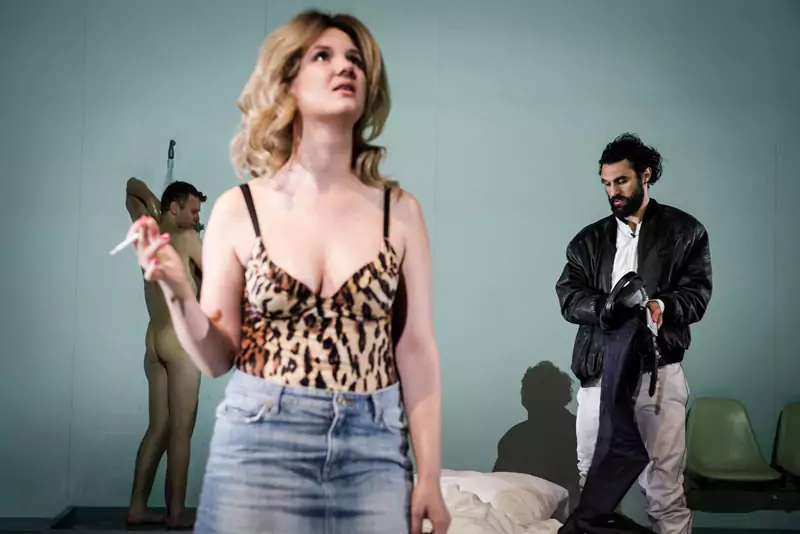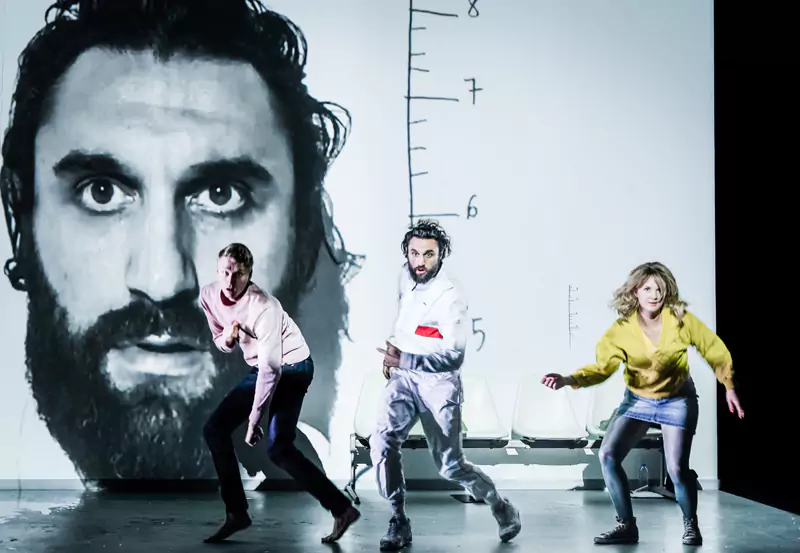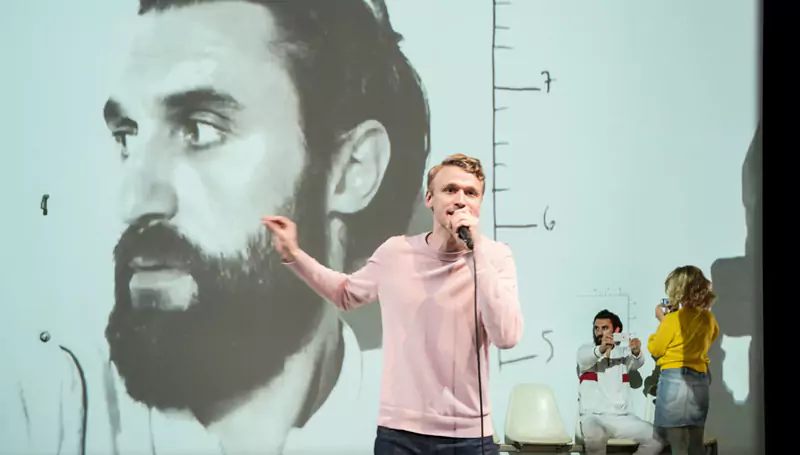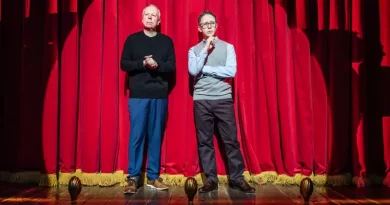“History of Violence”, Festival de Almada
Dana Rufolo in Portugal
9 July 2025
Almost certainly, Thomas Ostermeier doesn’t wake up every morning telling himself, “I am the director of the Berlin Schaubühne, Bertolt Brecht’s theatre. What am I doing to preserve his epic approach to drama?” And yet, History of Violence – which he directs as a dramatization of an intimate encounter between two men told from multiple perspectives that oblige the audience to find their own truth – is indeed steeped in the Brechtian tradition, albeit modified. Much more so than Ostermeier’s former offering at the Almada Theatre Festival, Sophocles’ Oedipus in a reinterpreted version by the Schaubühne dramaturg Maja Zade.

Laurenz Laufenberg, Alina Stiegler, Renato Schuch.
Photo credit: Arno Declair.
History of Violence is Ostermeier’s staging of the bestseller French author Édouard Louis’ eponymous autobiography Histoire de la violence (2016) that describes how he was violently raped by a Frenchman whose parents immigrated from Algeria and are of Kabyle (Berber) origin. The true event took place on Christmas Eve when he was 20 years old.
There are four actors who play the main role of Eddy (Laurenz Laufenberg) and his erstwhile lover Reda (Renato Schuch), sister Clara (Alina Stiegler) and brother-in-law (Christoph Gawenda) – the latter three actors also playing the roles of forensic criminologists clad in haz mat suits who appear at the beginning and end of the play, a policeman and policewoman, and a medical doctor and nurse to whom Eddy goes to be examined. Importantly, for his presence objectifies the action, another person is on stage as well, a musician Thomas Witte, who accompanies the action with his drumkit.
Eddy is the central character, and his story is simple, even eloquent. He’s a bubbly young intellectual type who meets Reda on the street on Christmas Eve, on his way home after a party. Reda cajoles Eddy into inviting him into his apartment. The apartment is represented by a bed on stage. Many of the scenes are projected onto the back wall which functions as a screen, via handheld iPhones. After banter and joking about, the two have sex (this is implied but not enacted). When Eddy leaves the bed to take a shower – there is a functioning shower head projecting from the rear wall of the living space – Reda steals his phone and then his wallet. Eddy discovers that his phone is missing and becomes obsessed with getting it back. He is completely trusting and doesn’t consider the possibility of Reda reacting violently, but he does do so: he takes out a gun and points it at Eddy, grabs a scarf and starts to strangle Eddy in a burst of rage, but Eddy fights back and manages, if barely, to escape the stranglehold.

Laurenz Laufenberg, Renato Schuch, Alina Stiegler.
Photo credit: Arno Declair.
Then, Reda pins Eddy down on the bed and rapes him while making vile and homophobic statements; blood flows from Eddy’s backside. Reda leaves, rings the doorbell to be admitted in again, is rejected (books are thrown at his enlarged face, live-feed projected onto the back wall), and then follow scenes with the police and the emergency room doctor. A forensic team of three in ghostly white suits re-enter so as to treat the stage space as a crime scene as they had done at the start of the drama; a powerful image is the small whirling brush that is distributing powder over the floor so as to search for evidence live-stream projected into an object many times its size onto the back wall. The sound it might make while turning is captured by Witte using drum brushes to create a whirring sound. This fusion of action, film, and drum sound is one of the most striking aspects of the entire evening.
That is Eddy’s story. But it is constantly being interrupted by others who are allowed free range of the stage space. Each group has its own opinion about the story. Sister Clara is clearly concerned for her brother, but she and her husband also see Reda as an immigrant and a thief. For them, he has stepped out of a newspaper article emphasizing how risky it is to welcome refugees. What in Eddy’s story – in the action we witness on stage – is Reda’s impulsive and psychologically motivated theft is, in the discourse of these family members, a planned attempt to steal and unsurprising (to them) for someone of his background. Hence, my reference to Brecht.
The story is fragmented suddenly; different groups interpret the action in radical, even opposing, ways. The audience will have to make up their own minds. The police continue this fragmentation process. Reda is a criminal, an “Arab”, and according to them he ought to be persecuted. But Eddy replies saying that there is no use in imprisoning Reda, what will that achieve? And the doctor is impartial and objective, prodding at Eddy’s body so as to make a report, administering anti-HIV medication, indifferent to the emotional trauma that accompanies the injuries he observes. During the hospital scene, Eddy breaks down and needs to be comforted; the doctor and nurse do so but in a way that smacks of trained tenderness devoid of spontaneous empathy.
Reda himself seems to blame his violent temper and extreme mood swings on having lived in a country that has allowed him to enter but not become a true part of it. He works in a bar illegally, and his father has had to endure humiliation and hardship. He assumes the rights of a self-aware victim to take revenge when and where it is possible to do so.
The acting is superb. Renato Schuch is a Berliner Ensemble star who played the father/son in Ostermeier’s Oedipus as mentioned above. But he was not alone in giving his character vigour and authenticity. Alina Stiegler as a stolid, chain-smoking transmitter of societal prejudices added an imposing no-nonsense female presence on stage. Gawenda has a restrained role as the person who supports his wife’s opinions. Although Ostermeier’s way of staging the play suggests that there can be no commonly agreed-upon meaning to the scenes we have all witnessed, the actors remain in character and are never reduced to being figureheads for societal and political positions. And yet that is what they represent: those variously conflicting thoughts and beliefs that require each and every one of us to form our own opinions. Brecht would have liked this neutrality.









